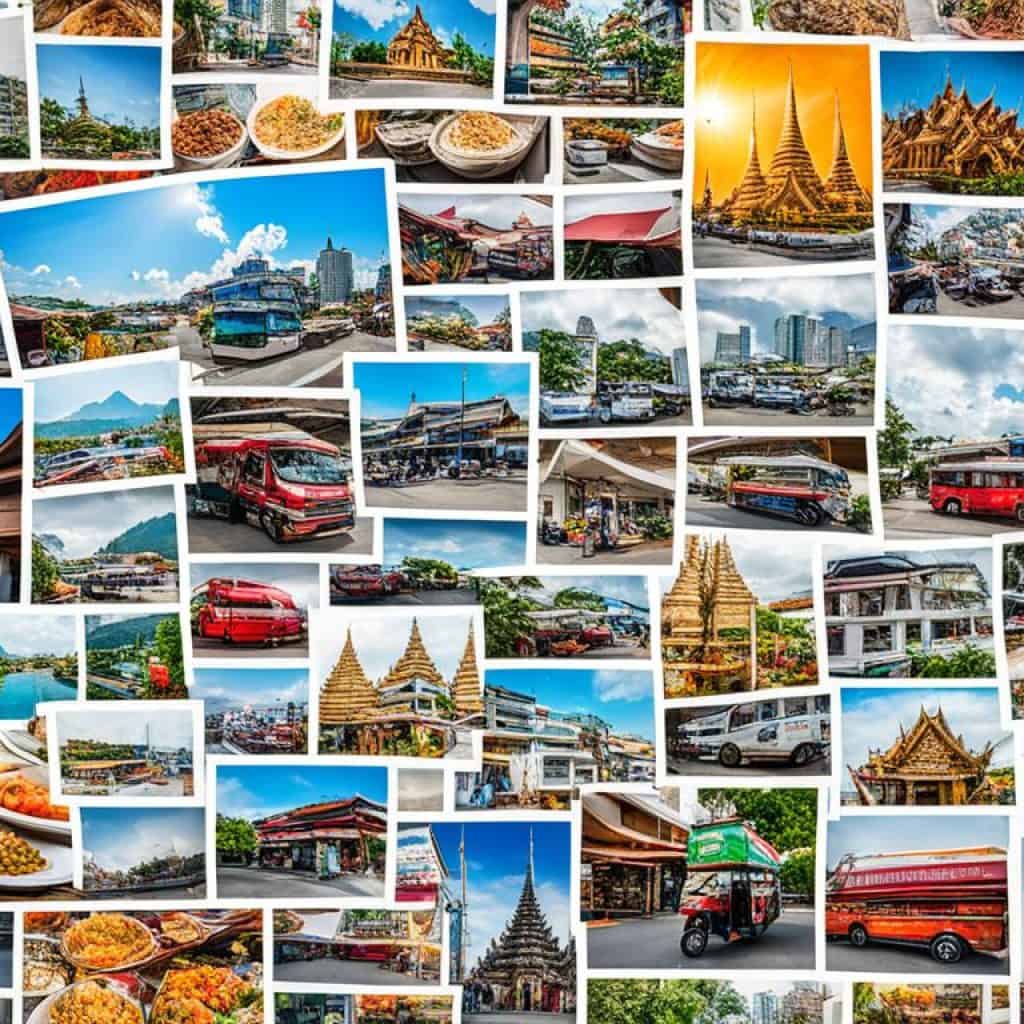Are you considering a life as an expat in Thailand? Wondering how to navigate the unique challenges and opportunities that come with living in this vibrant country? From working and cultural adaptation to connecting with the expat community, this comprehensive guide has you covered. Whether you’re planning to relocate, seeking information about visas and culture, or looking for advice and support, we have the insights and resources you need to thrive as an expat in Thailand.
Key Takeaways:
- Discover the friendly and welcoming environment in Thailand, known as the Land of Smiles.
- Embrace the diverse flavors and aromatic dishes of Thai cuisine.
- Learn essential Thai phrases and customs to navigate daily life.
- Become a skilled bargainer in markets and street stalls.
- Build a supportive expat network and find valuable advice and support.
Welcome to Thailand: Land of Smiles
Thailand, also known as the Land of Smiles, welcomes expats with open arms to its vibrant and warm-hearted culture. The Thai people are renowned for their friendliness and hospitality, making it easy for expats to feel at home in this beautiful country.
Embracing the local culture is key to creating a fulfilling expat life in Thailand. From trying out delicious street food to immersing yourself in traditional festivals and customs, there are endless opportunities to appreciate and participate in the rich Thai heritage.
Living in Thailand as an expat offers a unique experience that allows you to discover the country’s wonders at your own pace. Whether it’s exploring the lively markets, soaking up the sun on pristine beaches, or indulging in the tranquility of Buddhist temples, Thailand caters to diverse interests and preferences.
As an expat in Thailand, you’ll have the chance to encounter a multicultural community, where connections and friendships flourish. Engaging with the expat community and participating in social events, language exchanges, and group activities will not only help you build a robust support network but also provide endless opportunities for learning and growth.
“Thailand offers a unique blend of natural beauty, friendly locals, and a rich cultural tapestry. Living as an expat here allows you to fully immerse yourself in a diverse and vibrant environment, making every day an adventure.”
Key Tips for Expat Life in Thailand:
- Learn a few basic phrases in Thai to enhance your interactions with locals.
- Be respectful towards Thai customs and traditions, including the wai greeting.
- Take advantage of the affordable transportation options, such as tuk-tuks, songthaews, and motorbike taxis, to navigate the cities.
- Immerse yourself in the flavors of Thai cuisine, from the iconic pad thai to the refreshing som tum salad.
- Make an effort to connect with the expat community through social events, clubs, and online forums.
Living as an expat in Thailand is a rewarding experience that offers adventure, cultural immersion, and endless opportunities for personal growth. By embracing the Thai way of life, you’ll truly discover what it means to live in the Land of Smiles.
The Delights of Thai Cuisine
Thai cuisine is renowned worldwide for its diverse flavors and aromatic dishes. It is a true delight for the senses, offering a unique culinary experience that reflects the rich culture and traditions of Thailand. From the humble street food stalls to the elegant fine-dining restaurants, Thailand has something to satisfy every palate.
One of the best ways for expats living in Thailand to immerse themselves in the local culture is through the exploration of Thai cuisine. By embracing the vibrant street food scene, expats can discover an array of flavors and dishes that are often considered hidden gems. Thai street food is known for its affordability, authenticity, and incredible variety.
When indulging in street food, it’s important to remember a few tips. Look for stalls with long queues, as it’s a good indication of the food’s popularity and quality. Don’t be afraid to try new dishes and flavors. From spicy papaya salads to savory pad Thai noodles, Thailand offers a plethora of options for adventurous taste buds.
“Thai cuisine is a work of art, combining complex flavors, fresh ingredients, and vibrant colors. It’s a culinary journey worth exploring.”
Thai cuisine is a combination of bold, contrasting flavors that create a harmonious balance on the plate. The famous Thai dishes like Tom Yum Soup, Green Curry, and Pad Thai are a delight to the taste buds. Each bite offers an explosion of flavors – sweet, sour, salty, and spicy – that tantalize the senses.
Thai food culture also emphasizes the importance of communal dining and sharing meals with others. It is not uncommon to order multiple dishes and share them among friends and family. This communal aspect adds a social element to the dining experience and encourages connections with others, both locals and fellow expats.
If you’re new to Thai cuisine, you may find yourself encountering dishes with a spicy kick. Thai food is known for its spiciness, and it’s an integral part of the culinary experience. Start with milder dishes and gradually increase your tolerance for spice. Don’t hesitate to request less chili if you prefer a milder flavor profile.
Exploring the local culinary scene goes beyond just street food. Thailand also offers a wide range of high-end dining options that showcase the creativity and skills of Thai chefs. These restaurants often provide a fusion of traditional Thai flavors with modern techniques and presentations, offering a unique fine-dining experience.
“Thai cuisine is a celebration of flavors, a journey of culinary discovery, and an indispensable part of the expat life in Thailand.”
Must-Try Thai Dishes
Here are some iconic Thai dishes that every expat in Thailand should try:
- Tom Yum Soup: A hot and sour soup with a fragrant blend of lemongrass, chili, and lime.
- Pad Thai: Stir-fried rice noodles with shrimp, tofu, bean sprouts, and crushed peanuts.
- Green Curry: A spicy coconut curry with chicken or vegetables, flavored with Thai basil and kaffir lime.
- Som Tum: A tangy and spicy green papaya salad with peanuts and dried shrimp.
- Mango Sticky Rice: A sweet and refreshing dessert made with ripe mangoes and sticky rice, topped with coconut cream.
These dishes are just a taste of the diverse culinary landscape that Thailand has to offer. Each region of the country has its own specialties and unique flavors, making Thai cuisine a fascinating and ever-evolving adventure.
Embracing the Thai Language and Customs
Although not essential to become fluent in the Thai language, learning a few basic phrases can significantly enhance your expat experience in Thailand. It shows respect for the local culture and allows you to connect with Thai people on a deeper level. Here are some essential phrases to know:
Sawasdee: Hello
Khap/Kha: A polite way to end a sentence for men/women
Khob khun: Thank you
Chai: Yes
Mai chai: No
Nee tao rai?: How much is this?
Rot dee: Delicious
Phom bpai: I am going
Respecting Thai customs and traditions is also crucial for expats living in Thailand. Here are some key customs to bear in mind:
- When visiting temples or religious sites, it’s essential to dress modestly, covering your shoulders and knees.
- The traditional Thai greeting, known as the “wai,” involves pressing your palms together in a prayer-like gesture and bowing slightly. It’s customary to return the gesture when greeted with a wai.
- Shoes should be removed before entering someone’s home or certain establishments, such as temples and some shops.
- Thai people highly value politeness and harmony, so it’s important to avoid confrontations or raising your voice.
- The “Mai Pen Rai” attitude, meaning “never mind” or “don’t worry,” is a prevalent mindset in Thailand. It encourages a go-with-the-flow attitude and teaches patience and acceptance.
Fun Fact
Did you know that the Thai language has 44 consonant sounds and 32 vowel sounds? It’s an intricate language full of rich cultural nuances.
| Phrase | English Translation |
|---|---|
| Sawasdee | Hello |
| Khap/Kha | A polite way to end a sentence for men/women |
| Khob khun | Thank you |
| Chai | Yes |
| Mai chai | No |
| Nee tao rai? | How much is this? |
| Rot dee | Delicious |
| Phom bpai | I am going |
Bargaining Like a Pro in Thailand
Bargaining is an exciting and widespread practice in Thailand, particularly in vibrant markets and bustling street stalls. Mastering the art of negotiation can not only save you money but also provide a unique cultural experience. Here are some invaluable tips to help you become a skilled bargainer in the Land of Smiles.
Start Low and Be Patient
When negotiating the price of an item in Thailand, it’s essential to begin with a low offer. This sets the stage for bargaining and allows room for negotiation. Remember, the initial price quoted by the seller is often higher than the final agreed-upon price.
Additionally, be patient during the bargaining process. Negotiations in Thailand can take time, so maintain a positive attitude and enjoy the interaction with the vendor. Patience and perseverance can often lead to great deals.
The “Walk Away” Technique
If you feel that the seller is unwilling to meet your desired price, don’t be afraid to employ the “walk away” technique. This involves politely expressing your gratitude and starting to move away from the vendor. In many cases, the vendor may call you back and offer a lower price in an attempt to secure the sale.
However, it’s important to be respectful when using this technique. Avoid any aggressive or confrontational behavior, as it may sour the negotiation process and damage the relationship with the vendor.
Buy in Bulk for Bargaining Power
One effective strategy for bargaining in Thailand is to purchase multiple items from the same vendor. Buying in bulk gives you additional bargaining power, as it indicates your seriousness as a customer. Vendors are often more willing to offer better prices when they perceive a larger sale.
Whether you’re buying souvenirs or clothing, consider purchasing multiple items to enhance your bargaining position and secure favorable deals.
“Bargaining in Thailand is not just about securing the best price—it’s about building connections and enjoying the lively market culture.”
Remember, bargaining in Thailand is not just about securing the best price—it’s about building connections and enjoying the lively market culture. Approach negotiations with a friendly demeanor, engage in pleasant conversation with the vendors, and embrace the experience as an integral part of Thailand’s vibrant culture.
| Benefits of Bargaining in Thailand |
|---|
| Opportunity to get unique and affordable souvenirs |
| Engagement with local vendors and immersion in Thai culture |
| Enhancement of negotiation skills and confidence |
| Potential for significant cost savings |
So the next time you find yourself in a vibrant Thai market, don’t hesitate to embrace the excitement of bargaining. With these tips in mind, you’ll be well-equipped to navigate the negotiation process with ease, secure great deals, and enjoy the authentic Thai shopping experience.
Building a Supportive Expat Network
Living in Thailand as an expat can be an exciting adventure filled with new experiences and opportunities. One of the key factors in making the most out of your expat life here is building a supportive network of fellow expats.
Joining the Thailand expat community allows you to connect with like-minded individuals who understand the unique challenges and joys of living in a foreign country. These connections not only provide a sense of belonging but also offer valuable advice, support, and friendship.
To build your expat network, consider participating in language exchange meetups where you can meet both locals and other expats who are eager to practice their language skills. These meetups provide a fun and casual setting to connect with new friends while improving your language abilities.
Sports clubs are another excellent way to meet fellow expats who share similar interests. Whether you enjoy football, yoga, or hiking, joining a sports club can help you forge friendships while staying active and healthy.
“Being part of the expat community in Thailand has been an incredible experience. I’ve met amazing people from all over the world who have become my support system away from home. We share stories, tips, and adventures, making every day in Thailand feel even more special.”
Volunteer organizations also offer a fantastic opportunity to connect with both expats and locals who are passionate about giving back to the community. Engaging in volunteer work not only helps you make a positive impact but also allows you to meet individuals who share your values and interests.
Additionally, online forums dedicated to the Thailand expat community are a valuable resource for seeking advice, sharing experiences, and connecting with others. These forums provide a virtual space where you can ask questions, find recommendations, and build a network of expat friends.
By actively participating in the expat community and seeking opportunities to connect, you’ll enhance your expat experience in Thailand, creating lasting friendships and receiving invaluable support that will make your time here even more rewarding.
Staying Healthy and Safe in Thailand
Ensuring your health and safety is paramount when living as an expat in Thailand. By following these practical tips, you can take proactive steps to protect yourself and enjoy your time in this vibrant country.
Register with the Embassy
One of the first things you should do as an expat in Thailand is to register with your embassy or consulate. This provides you with important updates, emergency assistance, and helps ensure your well-being during your stay.
Practice Food Hygiene
Thai cuisine is renowned for its delicious flavors, but it’s essential to maintain proper food hygiene to prevent any health issues. Choose food vendors with good hygiene practices, opt for cooked meals, and avoid consuming street food that has been left out in the heat for extended periods.
Stay Up-to-Date with Vaccinations
To protect yourself against common illnesses and diseases in Thailand, make sure your immunizations are up-to-date before your arrival. Consult with your healthcare provider to determine which vaccinations you may require, such as hepatitis A and B, typhoid, or Japanese encephalitis.
Be Mindful of Local Wildlife
Thailand is home to diverse wildlife, including some species that can be potentially dangerous. Respect their natural habitats, avoid approaching or interacting with wild animals, and be cautious when exploring nature reserves or national parks.
Stay Informed
Keep track of local news and current events in Thailand. It’s important to stay updated on any potential safety concerns, weather advisories, or political situations that may impact your well-being. Remain vigilant and make informed decisions based on the latest information.
Remember, your health and safety are your utmost priority. By being proactive and taking sensible precautions, you can enjoy your expat life in Thailand while staying safe and healthy.
| Emergency Contact Information | Phone Number |
|---|---|
| Tourist Police | 1155 |
| Ambulance and Rescue | 1669 |
| Police (Non-Emergency Number) | 191 |
| Fire | 199 |

Ensuring your well-being during your time in Thailand is essential for a fulfilling expat experience. By adhering to these simple guidelines, you can enjoy the incredible sights, sounds, and culture of Thailand while staying healthy and safe.
Continuing Personal Growth as an Expat
As an expat living in Thailand, it’s important to not only adapt to your new surroundings but also continue personal growth throughout your journey. Embracing personal growth allows you to make the most of your expat experience and thrive in the Land of Smiles. Here are some key tips to help you along the way:
Reflect on Your Experiences
Take the time to reflect on your experiences as an expat in Thailand. Whether it’s the challenges you’ve overcome or the exciting adventures you’ve had, reflecting allows you to gain valuable insights and learn from your journey. Embrace both the highs and lows, as they contribute to your personal growth as an expat.
Explore Beyond Tourist Hotspots
While Thailand is famous for its beautiful beaches and bustling cities, it’s important to explore beyond the tourist hotspots. Venture into the lesser-known areas and embrace the hidden treasures that Thailand has to offer. Discover the local markets, interact with the friendly locals, and immerse yourself in the rich culture. By stepping outside your comfort zone, you’ll expand your horizons and further enrich your expat experience.
“The real voyage of discovery consists not in seeking new landscapes, but in having new eyes.” – Marcel Proust
Embrace New Opportunities
Living in a foreign country presents countless opportunities for personal growth. Whether it’s learning a new skill, volunteering for a local charity, or joining local community events, embrace these opportunities with an open mind and a willingness to learn. Engaging with the local community allows you to connect on a deeper level, broaden your perspectives, and develop new friendships with both locals and fellow expats.
Cultivate Mindfulness
Practicing mindfulness can greatly contribute to your personal growth as an expat. Take the time to appreciate the present moment, observe the beauty around you, and be fully present in every experience. Allow yourself to fully immerse in the Thai way of life, savoring the flavors of Thai cuisine, and embracing the warmth of Thai hospitality. Cultivating mindfulness helps you develop a deeper sense of gratitude and enhances your overall well-being as an expat in Thailand.
By continuing your personal growth as an expat in Thailand, you’ll not only thrive in your new environment but also create lasting memories and experiences that will stay with you for a lifetime. Don’t be afraid to step out of your comfort zone, embrace new opportunities, and discover the true essence of Thailand. Your expat journey is an incredible opportunity for self-discovery and personal development.
The Thriving Expat Job Market
Thailand offers a diverse range of job opportunities for expats, making it an attractive destination for those seeking new professional experiences. Whether you are interested in teaching English, pursuing a business career, or exploring other industries, Thailand has options to suit various skill sets and interests.
When considering working in Thailand as an expat, it’s important to familiarize yourself with the local job market to maximize your chances of success. Here is an overview of key considerations:
- Job opportunities: Thailand’s thriving job market offers positions in industries such as education, tourism, information technology, finance, and hospitality. Expats with specialized skills and qualifications are particularly sought after.
- Teaching opportunities: Teaching English is a popular choice for expats in Thailand. The demand for English language education is high, providing numerous opportunities in schools, language centers, and universities.
- Business roles: Thailand’s growing economy and strategic location in Southeast Asia make it an attractive destination for international businesses. Expats with managerial, technical, or entrepreneurial expertise can find rewarding opportunities in various sectors.
Income tax considerations are an important aspect of working in Thailand. As an expat, you will be subject to Thai income tax laws, which may differ from those in your home country. It’s advisable to seek professional advice to understand your tax obligations and ensure compliance.
Thailand also offers retirement options for expats who have reached the age of 50. The retirement visa allows you to live in Thailand while enjoying the country’s unique culture and lifestyle.
When it comes to succeeding in the Thai work environment, understanding and adhering to essential business etiquette is crucial. Thai culture places a strong emphasis on respect, hierarchy, and maintaining harmonious relationships. Familiarize yourself with local customs and practices to build rapport with colleagues and navigate professional interactions effectively.
Here is an example of a comprehensive table showcasing the job market opportunities for expats in Thailand:
| Industry | Job Opportunities | Skill Requirements | Salary Range |
|---|---|---|---|
| Education | English teachers, international school faculty | Bachelor’s degree, teaching experience, TEFL certification | $1,500 – $3,000 per month |
| Tourism | Hotel management, tour guiding | Hospitality management, language skills, customer service | $1,000 – $2,500 per month |
| Information Technology | Software developers, IT consultants | Technical expertise, programming languages, project management | $2,500 – $5,000 per month |
| Finance | Financial analysts, accountants, investment advisors | Finance/accounting qualifications, analytical skills, knowledge of Thai regulations | $2,000 – $5,000 per month |
As you can see, the job market in Thailand provides a wide range of opportunities for expats, catering to various interests and skill sets. It’s important to research, network, and align your qualifications with the desired industry to increase your chances of securing a rewarding job in Thailand.
Navigating the Cost of Living in Thailand
When planning your life as an expat in Thailand, it’s crucial to have a clear understanding of the cost of living. This section will guide you through the factors that contribute to the cost of living, banking options, currency, and provide a useful cost of living chart for reference.
Factors Influencing the Cost of Living
Several key factors affect the cost of living in Thailand. These include:
- Housing: The cost of renting or purchasing a property
- Transportation: Expenses related to commuting, owning a vehicle, or using public transportation
- Food and groceries: The cost of dining out and purchasing groceries
- Utilities: Monthly expenses for electricity, water, internet, and other utilities
- Healthcare: The cost of medical care and health insurance
- Education: Expenses related to schooling, such as tuition fees
- Entertainment: Costs associated with leisure activities, including dining, shopping, and traveling
Banking Options and Currency
Thailand’s banking system offers a range of options for expats to manage their finances conveniently. Local and international banks provide personal and business accounts, ATM services, and various financial products. It’s advisable to research and compare different banks to find the one that best suits your needs. The local currency is the Thai Baht (THB), and being familiar with exchange rates and currency conversion will help you navigate your financial transactions seamlessly.
Cost of Living Chart
To give you a better idea of the average cost of living in Thailand, refer to the chart below:
| Expense Category | Average Monthly Cost (in THB) |
|---|---|
| Housing | 20,000 – 50,000 |
| Transportation | 2,000 – 8,000 |
| Food and Groceries | 5,000 – 10,000 |
| Utilities | 1,000 – 4,000 |
| Healthcare | 1,000 – 5,000 |
| Education | 10,000 – 30,000 |
| Entertainment | 5,000 – 15,000 |
Note: The figures provided in the chart are approximate and can vary depending on your location, lifestyle choices, and personal preferences. This chart serves as a general guideline to give you an idea of the average costs in different expense categories.
By understanding the factors that contribute to the cost of living in Thailand, exploring banking options, and referring to the cost of living chart, you can make informed financial decisions and effectively manage your expenses while enjoying your expat life in Thailand.

Accessing Healthcare in Thailand
As a Thailand expat, taking care of your health and well-being is essential for a fulfilling life abroad. Fortunately, Thailand boasts a high-quality and affordable healthcare system that caters to the needs of expats. Whether you require routine check-ups, specialized treatments, or emergency services, you can rest assured knowing that healthcare in Thailand is readily accessible.
To ensure the best possible care, it is advisable for expats to consider obtaining private medical insurance. This provides coverage for medical expenses, ensuring peace of mind and reducing financial burdens. Additionally, having insurance can grant you access to a wider network of healthcare facilities and specialists.
In case of emergencies, Thailand’s healthcare system is equipped to handle urgent medical situations. Hospitals and medical centers across the country are well-equipped with modern facilities and staffed by skilled healthcare professionals. Rest assured that you will receive prompt and quality care in times of need.
When living in Thailand, it’s important to be aware of potential health risks and take necessary precautions. The country is known for certain tropical diseases, such as dengue fever and malaria. It is recommended to stay up-to-date with vaccinations and take measures to prevent mosquito bites, such as using repellents and wearing protective clothing.
“Thailand’s healthcare system offers high-quality care and is accessible for expats. Private medical insurance is advisable to ensure comprehensive coverage. In case of emergencies, medical facilities are equipped to provide prompt care. Stay informed about potential health risks and take necessary precautions.”
When accessing healthcare services in Thailand, it’s important to have a basic understanding of the local healthcare system. English-speaking doctors and medical staff are available in many hospitals and clinics, which makes communication easier for expats. However, it may be helpful to learn some basic Thai medical terms to facilitate better communication.
For expats with specific medical needs or chronic conditions, it is advisable to bring any necessary medical documents and prescriptions from your home country. This will assist healthcare providers in understanding your medical history and providing appropriate care.
In conclusion, expats living in Thailand can expect quality and affordable healthcare services. By obtaining private medical insurance, staying informed about potential health risks, and familiarizing yourself with the local healthcare system, you can ensure the well-being of yourself and your family during your time in Thailand.
Settling Into Thai Education System
If you are an expat living in Thailand with children, understanding the Thai education system is crucial for their academic journey. In this section, we will provide you with valuable information on school attendance regulations, the availability of private and international schools, admission processes, and teaching philosophies in Thailand.
School Attendance Regulations
Thailand follows a mandatory education system that requires all children, regardless of their nationality, to attend school. The primary education level is divided into two stages: Prathom, covering grades 1 to 6, and Mathayom, covering grades 7 to 12. It’s important to familiarize yourself with the specific attendance regulations enforced by the Ministry of Education in Thailand.
Private and International Schools
Thailand offers a wide range of educational options, including private and international schools that cater to expat children. Private schools often follow the Thai curriculum, while international schools provide education based on internationally recognized frameworks such as the International Baccalaureate (IB) or Cambridge curriculum. These schools often offer a multicultural learning environment and English as the primary language of instruction.
Admission Processes
Admission processes vary among schools in Thailand. Private schools typically require students to take entrance exams or assessments to determine their academic abilities. International schools may have different admission criteria, including interviews and previous academic records. It’s essential to research and understand the specific requirements and procedures of the schools you are interested in.
Teaching Philosophies
Thai schools generally emphasize discipline, respect, and rote learning. However, international schools often adopt more student-centered and inquiry-based teaching approaches. When choosing a school for your child, consider their preferred learning style and whether it aligns with your expectations.
Settling into the Thai education system may involve some research and decision-making, but there are numerous resources and support available to guide you through the process. Now let’s move on to explore the climate and weather in Thailand.
Climate and Weather in Thailand
Thailand is known for its delightful tropical climate, offering expats a warm and sunny environment to call home. The country experiences distinct seasons throughout the year, each with its own characteristics and charm.
The Hot Season
From March to May, Thailand experiences its hot season, with temperatures soaring and humidity levels rising. During this time, it is important for expats to take precautions to protect themselves from heatstroke, dehydration, and sunburn. Stay hydrated by drinking plenty of water, and avoid prolonged exposure to the sun, especially during the peak hours of the day.
The Rainy Season
The rainy season in Thailand typically starts in May or June and lasts until October or November. During this period, showers and thunderstorms are common, bringing a refreshing coolness to the air. While the rain may occasionally disrupt outdoor plans, it is an excellent time to explore the natural beauty of Thailand, with lush landscapes and vibrant vegetation.
“The hot season in Thailand may be intense, but the unique experiences and activities it offers more than make up for it. Similarly, the rainy season allows for a different kind of adventure, providing opportunities to witness the stunning natural landscapes in their prime. Embrace the seasons and make the most of your expat life in Thailand!”
Whether you enjoy the warmth of the hot season or the refreshing rainfall of the rainy season, Thailand’s climate offers a diverse and exciting environment for expats to experience. Embrace the unique characteristics of each season and make the most of your time in this beautiful country.
Protect yourself from the sun and enjoy the refreshing rainfall, for Thailand’s climate is an integral part of the expat life experience.
Navigating Thai Social Etiquette
Respecting Thai social etiquette is essential for expats to integrate into the local culture. Understanding and following the customs will help expats build positive relationships and show appreciation for Thai traditions. Here are some important aspects of Thai social etiquette to keep in mind:
The Wai Greeting
The wai is a traditional Thai greeting that involves pressing your palms together in a prayer-like gesture and bowing slightly. It is widely used to show respect, gratitude, and acknowledgment. When greeting someone in Thailand, initiate the wai, and let the Thai person guide you on the appropriate level of respect based on age or social status.
Dressing Modestly
When visiting religious sites, it is important to dress modestly as a sign of respect. Both men and women should cover their shoulders and avoid wearing revealing clothing. Removing shoes before entering temples and other sacred places is also customary.
Avoiding Sensitive Topics
In Thai culture, discussions related to politics, religion, and the monarchy should be handled with great sensitivity. Avoid expressing personal opinions or engaging in debates on these topics, as it can be seen as disrespectful. Instead, focus on positive conversation topics that promote harmony and understanding.
“By understanding and respecting Thai social etiquette, expats can foster meaningful connections with the local community and fully appreciate the rich culture of Thailand.”
Remember that these are general guidelines, and it’s always helpful to observe and learn from the behaviors of the local Thai people around you. Embracing Thai social etiquette will not only help you integrate into the community but also deepen your cultural immersion during your expat life in Thailand.

| Dos | Don’ts |
|---|---|
|
|
Staying Connected in Thailand
When living as an expat in Thailand, staying connected is essential for maintaining communication with loved ones and accessing important resources. This section provides valuable information on the telecommunications services available in Thailand, including telephone, internet, and postal services.
Telecommunication Services
Thailand offers a reliable and extensive telecommunication network, ensuring expats can stay connected with ease. Whether you need to make international calls, access high-speed internet, or send mail and packages, there are various providers and services to meet your needs.
For telephone services, major mobile operators in Thailand include AIS, TrueMove, and dtac. These providers offer a range of prepaid and postpaid plans, allowing expats to choose the best option based on their usage and budget. International calling packages are also available, making it convenient to stay in touch with family and friends abroad.
When it comes to internet services, Thailand offers both fixed-line and mobile internet options. True Internet, 3BB, and AIS Fibre are some popular providers known for their reliable and high-speed internet connections. Internet plans are offered at different speeds and data limits, catering to the varying needs of expats.
Postal Services
To send mail and packages while in Thailand, the national postal service, Thailand Post, provides efficient and affordable services. Thailand Post has numerous branches throughout the country, offering both domestic and international shipping options. Whether you need to send postcards, letters, or larger packages, Thailand Post can assist you in safely delivering your items.
Staying Connected Online
In addition to traditional telecommunications services, staying connected online is a crucial aspect of expat life in Thailand. With a wide range of internet cafes, co-working spaces, and free Wi-Fi hotspots available in major cities and tourist areas, finding a place to connect to the internet is convenient.
Expats can also invest in a portable Wi-Fi device, commonly known as a pocket Wi-Fi or mobile hotspot, which provides a secure internet connection on-the-go. These devices are available through various mobile operators and offer the flexibility to connect multiple devices simultaneously.
Lastly, it’s important to note that Thailand’s internet censorship laws may restrict access to certain websites and online content. To bypass these restrictions, expats can consider using a virtual private network (VPN) service, which encrypts internet traffic and allows users to access blocked content securely.
With the telecommunications services available in Thailand, expats can easily stay connected with their loved ones and access essential communication channels. Whether it’s making phone calls, surfing the internet, or sending mail, staying connected in Thailand is simple and convenient.
Conclusion
In conclusion, this comprehensive guide serves as an invaluable resource for Thailand expats seeking to establish and flourish in their new lives abroad. With a wealth of information on cultural adaptation, building a support network, accessing healthcare, navigating the education system, and more, expats can confidently embrace the opportunities and challenges that living in Thailand presents.
Whether you are a professional relocating for work, a retiree seeking a vibrant and affordable retirement destination, or a family looking for a multicultural and enriching environment for your children, this guide provides the essential knowledge and insights to make your expat journey in Thailand a resounding success.
From understanding Thai social etiquette to appreciating the tantalizing flavors of Thai cuisine, this guide equips expats with the necessary tools to fully immerse themselves in the rich tapestry of Thai culture and society. Additionally, the guide offers practical advice on navigating administrative procedures, such as obtaining visas and understanding the cost of living, ensuring a smooth transition to expat life in Thailand.
With the guidance and resources provided in this Thailand expat guide, expats can confidently embrace their new adventure and make the most of their time in this beautiful country. Whether you are here for a short-term assignment or planning to call Thailand your long-term home, this guide will support you in thriving and living a fulfilling expat life in the Land of Smiles.
FAQ
What is the expat community like in Thailand?
The expat community in Thailand is vibrant and welcoming, with many support networks and social groups available for expats to connect with.
Is it necessary to learn the Thai language as an expat in Thailand?
While not necessary to become fluent, learning basic Thai phrases can greatly enhance your expat experience in Thailand and show respect for the local culture.
How can I become a skilled bargainer in Thailand?
To become a skilled bargainer, start with a lower offer, practice the “walk away” method, and consider buying multiple items to increase your bargaining power.
How can I build a supportive expat network in Thailand?
Building a supportive expat network in Thailand involves joining the expat community, participating in language exchange meetups, sports clubs, and volunteer organizations.
What are some tips for staying healthy and safe while living in Thailand?
Some tips for staying healthy and safe in Thailand include registering with the embassy, practicing food hygiene, staying up-to-date with vaccinations, and avoiding political demonstrations or gatherings.
How can I continue to grow personally as an expat in Thailand?
To continue personal growth as an expat in Thailand, reflect on your experiences, explore beyond tourist hotspots, and embrace the hidden treasures that Thailand has to offer.
What job opportunities are available for expats in Thailand?
Thailand offers a range of job opportunities for expats, including teaching and business roles. Understanding the job market, income tax considerations, and essential business etiquette is important for success.
How can I navigate the cost of living in Thailand?
To navigate the cost of living in Thailand, consider factors such as currency, banking options, and refer to the provided cost of living chart. This will help you make informed financial decisions while living in Thailand.
What healthcare options are available for expats in Thailand?
Thailand has a high-quality and affordable healthcare system. This section explores healthcare options for expats, including private medical insurance, emergency services, and the importance of vaccinations.
How can I find suitable educational options for my children in Thailand?
This section provides information on the Thai education system, including school attendance regulations, the availability of private and international schools, admission processes, and teaching philosophies.
What should I be aware of regarding the climate and weather in Thailand?
Thailand enjoys a tropical climate with distinct seasons. It is important to take precautions during the hot season and the rainy season, such as protecting oneself from heatstroke, dehydration, and sunburn.
How can I respectfully navigate Thai social etiquette?
Respecting Thai social etiquette involves practices such as the wai greeting, dressing modestly at religious sites, and avoiding discussing certain topics, such as politics, in public.
What communication services are available in Thailand?
This section provides information on telecommunications services in Thailand, including telephone, internet, and postal services. It offers guidance on staying connected and accessing essential communication channels.


















Add comment